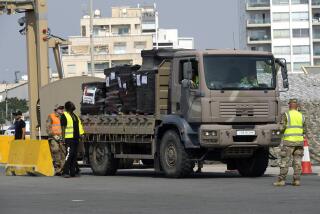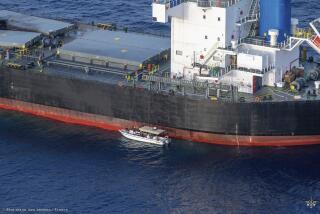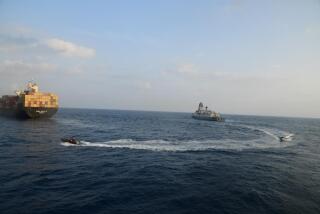Ethiopia Seizure of Ship With Food Assailed by U.S.
- Share via
WASHINGTON — Ethiopia has seized a cargo ship carrying Australian food to rebel-held areas in an unconscionable act that is destructive to efforts to aid the drought-stricken African nation, a State Department official said Thursday.
Calling on the United Nations to investigate the matter, M. Peter McPherson, administrator of the Agency for International Development, said the U.S. government is upset by Ethiopia’s action.
McPherson’s comments, echoed by other officials, came during a Senate Foreign Relations Committee hearing on the worsening African famine. The session was called to hear testimony on the Reagan Administration’s request for an additional $235 million to aid millions of people in a number of sub-Saharan countries threatened by starvation, but it turned into a forum for criticism of the Ethiopian government.
Amid the public’s unprecedented response to the Ethiopian famine, U.S. government officials had set aside their political differences with the Marxist-led nation, seeking to thaw relations enough to allow free movement of food, clothing and medical and other supplies into the country.
But Ethiopia’s seizure this week of the cargo ship Golden Venture at the Red Sea port of Assab has created new tensions. The vessel was loaded with 6,000 tons of food and other relief supplies bound for the provinces of Eritrea and Tigre, where separatists are battling Ethiopian government troops.
In Australia, Foreign Minister Bill Hayden said his government will protest the ship’s seizure and demand that its cargo be released, news agencies reported. Hayden stressed that the estimated $1.2 million in aid for Ethiopian rebel areas was for humanitarian purposes and not intended to support guerrillas.
Hayden said the freighter, reportedly of Liberian registry with a mostly Taiwanese crew, had disregarded instructions and put in at the Ethiopian port Monday instead of at a port in Ethiopia’s neighbor, Sudan, where it was supposed to have unloaded the goods.
Diplomatic sources in Nairobi said the ship was carrying 6,000 tons of wheat for rebel-controlled areas and another 3,500 tons for elsewhere in Ethiopia, plus trucks, medicines, blankets and a well-drilling rig, it was reported.
A spokesman for the Ethiopian Foreign Ministry said that Australia’s aid for rebel areas was “tantamount to interference in our internal affairs.” The Ethiopian government has repeatedly denied charges by secessionist groups that it is ignoring the plight of starving people in guerrilla-held areas.
Dockworkers in Assab had almost completed unloading the freighter by Thursday evening, and the ship and crew were expected to be allowed to leave the Ethiopian port, the Associated Press reported.
Seizure of the Golden Venture brought to the surface the simmering anger among many U.S. officials, who believe the United States and other nations are trying to help a country that is not trying to help itself--a nation that, in fact, makes it difficult for others to help.
At the hearing, Chester A. Crocker, assistant secretary of state for African affairs, said that Ethiopia has contributed to its problems “with poor agricultural policies, influenced by failed Soviet collectivist practices.”
Similarly, Sen. Nancy Landon Kassebaum (R-Kan.) traced Ethiopia’s massive poverty to “overpopulation, failed government policies and corruption.”
In an assertion that seemed to sum up the attitude of many officials, Sen. Richard G. Lugar (R-Ind.), the new chairman of the Foreign Relations Committee, warned that in the face of Ethiopia’s actions “the patience of the world is likely to decline.”
As a result of Ethiopia’s policies “there are millions being starved out,” Lugar charged.
While Ethiopia’s problems have received broad attention, relief officials increasingly are concerned about refugees, drought and famine in about 30 other countries in the region, where as many as 14 million are threatened with starvation. In addition to Ethiopia, officials cite Senegal, Kenya, Mozambique, Chad, Mali, Niger, Mauritania and Sudan as most seriously threatened.
Calling the problems in Sudan an explosion, McPherson announced that the U.S. government is providing an additional $24 million in emergency food assistance to that nation, bringing total aid since the fiscal year began Oct. 1 to $47 million. He also announced $12.9 million in food aid to be divided among Mali, Burkina Faso (formerly Upper Volta), Niger and Mozambique.
Overall, McPherson said, the United States since October has provided Africa with 851,900 metric tons of food valued at $329 million.
During the hearing, several officials discussed the need to find long-term solutions to the continent’s recurring problems with drought and famine and agreed that stabilized governments with technical aid and incentives to farmers are essential to that effort.
More to Read
Sign up for Essential California
The most important California stories and recommendations in your inbox every morning.
You may occasionally receive promotional content from the Los Angeles Times.













